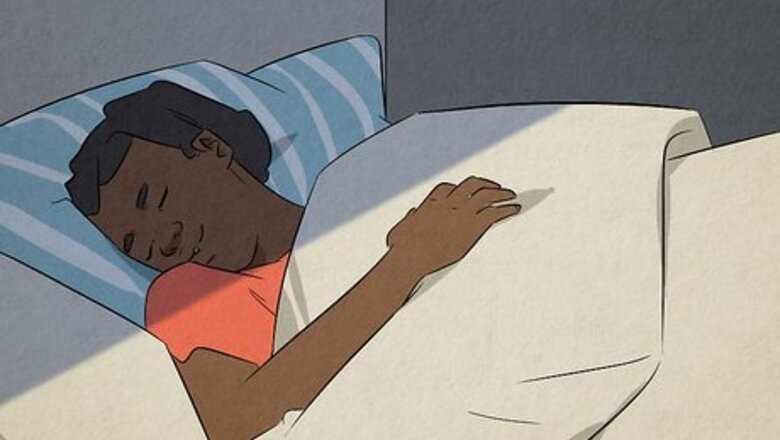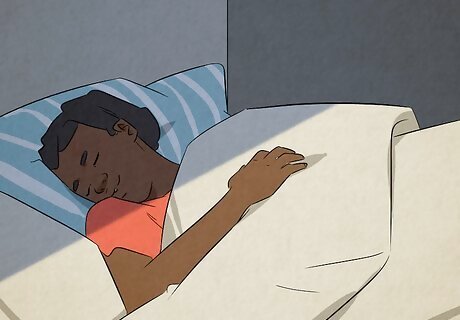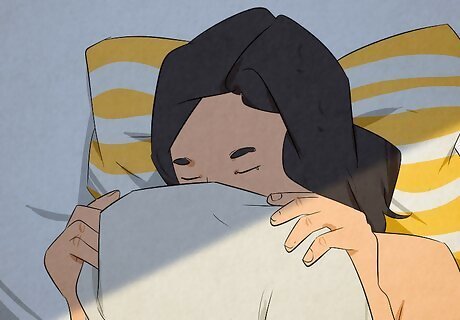
views
Your life is going well.

You may not have any spiritual messages right now. Your unconscious mind creates your dreams, and many people believe that it can give you messages while you’re asleep, pointing to your fears, worries, or just things going on in your life. If you’re on the right path, you might not need any help from your dreams. In this case, not dreaming is actually a good thing. To see if this is the case for you, ask yourself: Am I living my best life? Do I feel like I’m going in the right direction? Am I feeling positive about my progress? Am I handling obstacles well?
You’re ignoring your inner messages.

Your dreams may stop if you’re not listening to them. Paying attention to your dreams actually teaches your brain that they’re important to you. But when you ignore their messages, you may notice that you don’t dream as often. Making an effort to recall your dreams may actually help you start dreaming more. When you go to sleep, think about a problem or situation that you need to resolve, and ask your unconscious mind to help you while you’re sleeping. Every morning, reflect on what you experienced in your sleep. If you didn’t dream, remind yourself that next time could be different.
You’re not ready for the message.

Your unconscious mind can actually stop you from noticing things. When you’re awake, that might mean focusing your attention on something positive so you won’t notice something negative. When you’re asleep, it could mean filtering your dreams. Be patient because you’ll find out what you need to know when the timing is right. Being strong spiritually and open to change might help you become more receptive to the messages your dreams are sending.
You don’t fully trust yourself.

When you doubt your instincts, you also lose faith in your dreams. Remember, the messages you receive from your dreams come from deep inside yourself. You have to trust that you know what’s best for you. To build trust in yourself: Forgive yourself for your regrets and any mistakes you’ve made. Confront your inner critic and figure out how it’s trying to help you. Let go of the past.
You’re being guided by fear.

Fear makes it hard to receive messages from your higher self. You may need to let go of that fear so you can reconnect with your unconscious mind and receive dreams again. You can overcome fear by: Remembering how things can go right. Focusing on solutions to your problems. Telling yourself affirmations like, “I can do this,” “Things have always worked out before,” and “I have people on my side.”
You’re in a transition period.

Changes in your life can affect your dreams. In some cases, you may dream about the upcoming transition and might even receive guidance for what to do. On the other hand, your dreams may temporarily stop if that’s what’s best for you at the time. Once you’re ready to dream again, they might return. Look for ways that your life may be changing. Maybe you’re getting a new job or moving to a new city.
Your life is unbalanced.

Dreams are shaped by your personality and interests. They draw images and scenarios from your real life to create stories or metaphors that you’ll understand. When there’s an imbalance in your life, it could temporarily make you lose touch with who you are. In turn, that could make it hard for you to dream. Are you losing touch with your interests? Are you trying too hard to be what someone else wants you to be? Are you working so hard that you don't have time for fun?
You’re sabotaging yourself.

Self-sabotage undermines the messages you get through your dreams. Your unconscious mind wants you to be your best self, but that’s really hard to do if you’re standing in your own way. You can stop self-sabotaging by: Recognizing that you’re just trying to protect yourself. Figuring out how you’re sabotaging yourself and what you could do better. Making a list of small steps you can take to change your habits. Encouraging yourself with positive self-talk.
You’re closed off from your emotions.

Dreams are often connected to your emotions. You may even experience a roller coaster of emotions during the dream itself. When you’re closed off to emotions, your unconscious mind may protect you from them by stopping your dreams. Facing your emotions may help you unlock your dreams in the future. Give yourself permission to feel. Release your emotions by talking to a friend, doing something active, or writing in a journal.
You’re struggling with your mental health.

Your mental health and inability to dream may be related to poor sleep. To dream, you need to have rapid eye-movement (REM) sleep. Not having REM sleep actually correlates to mental health problems, so it makes sense that someone who isn’t dreaming might also feel depressed or anxious. Please talk to a therapist if you’re struggling with your mental health. They’ll give you the tools you need to feel better.
You’re disconnected from your spiritual side.

When you’re open spiritually, it’s easier to receive dream messages. In fact, spiritual people are more likely to find meaning in their dreams. So, exploring your spirituality may help you have better dreams. If you have spiritual practices, try participating in them more often. For instance, you might pray, meditate, or light a candle.
You dream but you don't remember them.

It’s possible to dream without knowing it. In fact, it's normal for people to not remember their dreams. Luckily, you can actually teach yourself to remember your dreams. Try this: Meditate before you go to sleep. Go to bed at the same time every day. Tell yourself that you want to remember your dreams while you’re falling asleep. Stay in bed and write down your dreams as soon as you wake up.


















Comments
0 comment